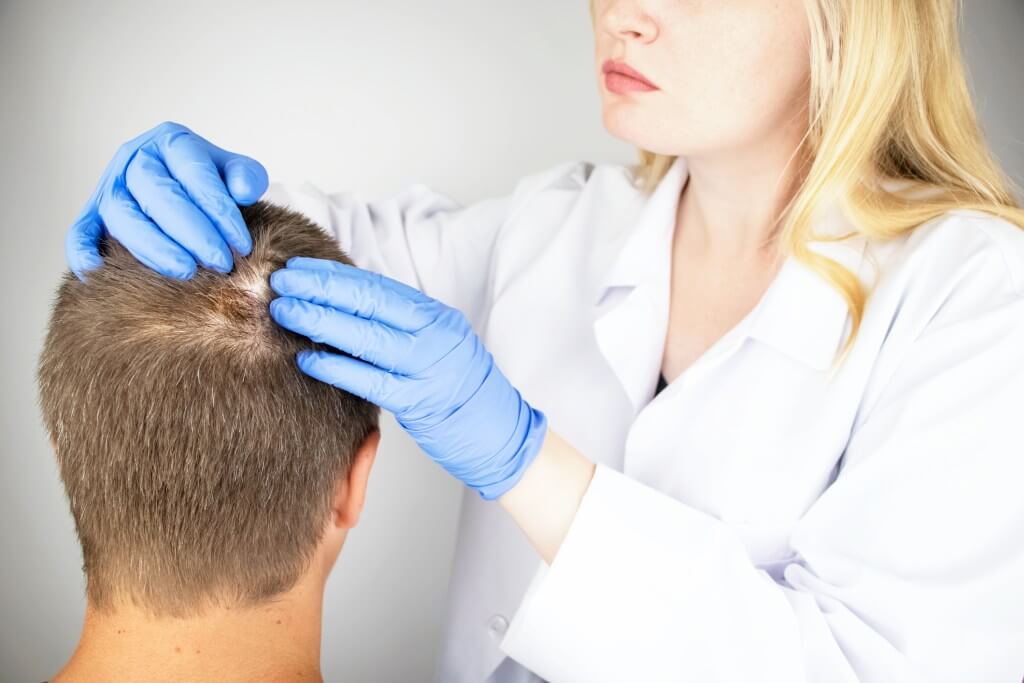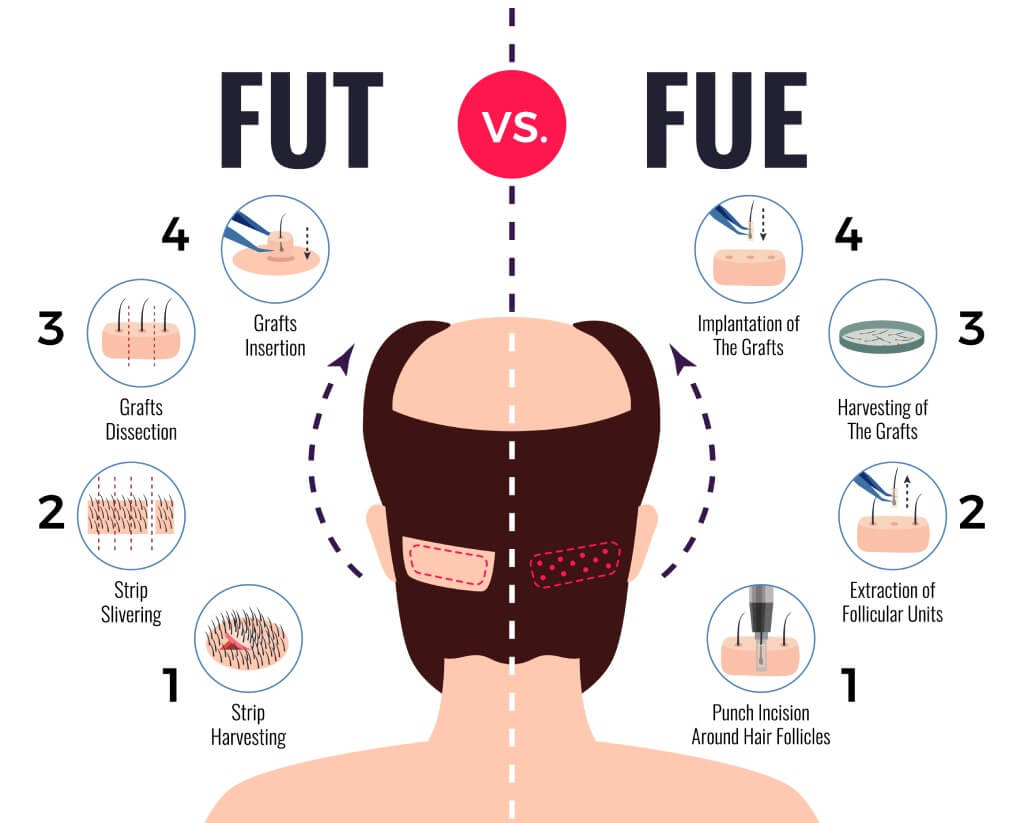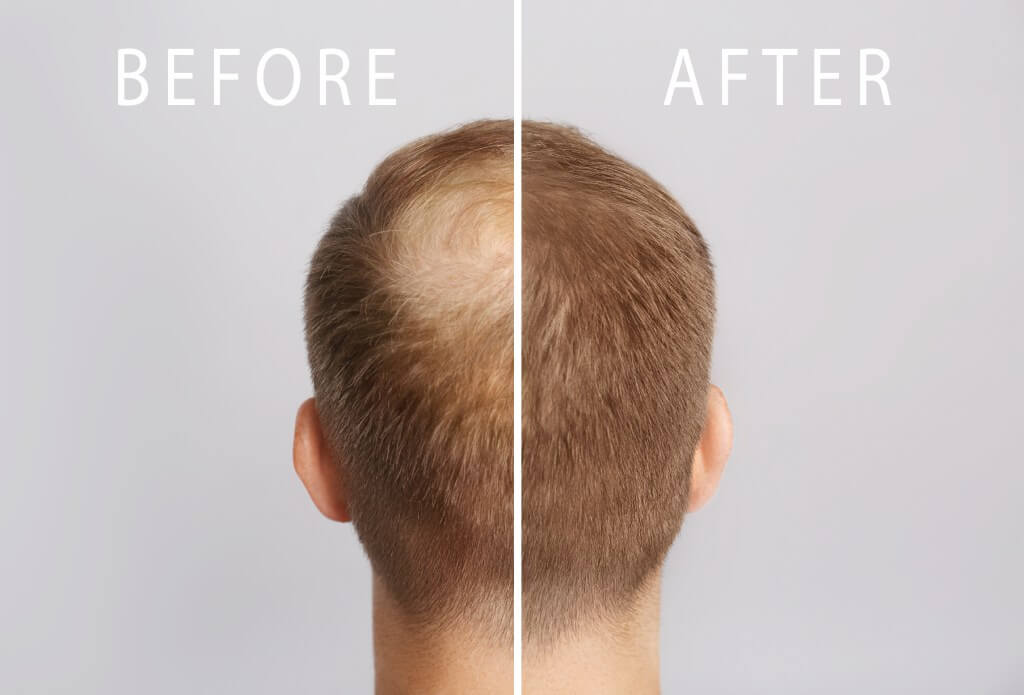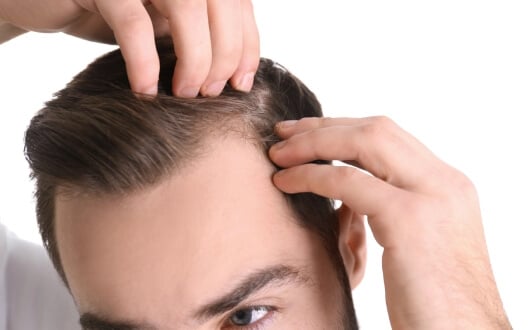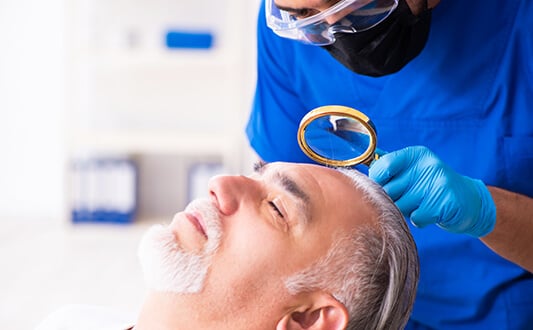- What makes your hair fall out?
- How to prevent baldness
- Medication therapy of hair loss
- Hair transplantation and restoration
- What are the steps of a hair transplant procedure
- Hair transplantation abroad
- Frequently asked questions of our patients
The problem of hair loss on the scalp or certain areas of the body worries more than half of the male population of European countries. Alopecia is much less common among representatives of the Mongoloid race and is almost absent among Africans. Baldness in women is less common, but it also forces us to look for effective hair restoration techniques to get rid of an unpleasant appearance and low self-esteem. Fortunately, the use of modern medical technologies successfully solves the problem, guaranteeing restoration and a natural-looking hair.
What makes your hair fall out?
Baldness is a complex pathological process associated with the disruption of the normal functioning of certain organs or their systems. Excessive hair loss or noticeable thinning can be caused by:
- hereditary predisposition (androgenetic alopecia), which occurs in men and women as a result of increased production of androgens;
- hormonal changes in the body of women during pregnancy, childbirth, menopause, use of hormonal contraceptives with progesterone;
- thyroid problems (hypothyroidism and hyperthyroidism);
- acute and chronic stress (causes telogen alopecia);
- hormonal imbalance in women due to estrogen deficiency and masculinization, manifested by seborrhea, acne, facial whiskers, excessive sebum production;
- autoimmune diseases (provoke focal alopecia);
- fungal infections of the scalp;
- chronic diseases (diabetes, lupus);
- physical and chemical damage to the skin;
- age-related changes during aging;
- lack of vitamins and minerals due to an unbalanced diet.
It is important to find and eliminate the underlying cause of alopecia for its treatment to be effective.
How to prevent baldness
To strengthen and maintain healthy hair, you need to:
- eat foods containing iron, zinc, protein, omega-3 fatty acids, vitamins A, C, E;
- maintain physical activity that improves blood circulation and hair growth;
- avoid stress, devoting enough time to rest and sleep;
- avoid frequent use of dyes and straighteners;
- use special mild shampoos and lotions that strengthen hair follicles.
Currently, there are various types of hair restoration: drug therapy, physiotherapy procedures (their effectiveness has not been proven), hair follicle grafting.
Medication therapy of hair loss
After a thorough examination of the patient, the doctor may prescribe drug therapy in combination with physiotherapy procedures, massage, the use of special creams, shampoos and lotions (their effectiveness is no more than 30%). In those cases, an individual treatment strategy is developed, taking into account the type of baldness and clinical indications. The use of antiandrogen agents, 5-alpha-reductase inhibitors (effective in the treatment of androgenetic alopecia), corticosteroids, and immunomodulators is indicated. However, drug therapy has a number of disadvantages:
- side effects such as skin irritation, unwanted hair growth on the face and other parts of the body, increased heart rate, sexual dysfunction, depression;
- the need for constant use, since the effectiveness of many products is maintained only with long-term use, the cessation of which leads to the resumption of hair loss;
- individual intolerance;
- a long time before visible results appear (from 6 months to one year).
Due to the lengthy duration of the therapy, drug treatment can be costly. What is the best hair restoration procedure in this case? Modern microsurgery offers a minimally-invasive transplant method – the ideal solution for hair restoration.
Hair transplantation and restoration
Currently, hair transplantation is the most popular method of combating baldness, especially when drug treatment does not produce the desired results.
What hair restoration techniques exist?
The method is chosen by the doctor, taking into account the type of alopecia, the degree of hair loss, and the characteristics of each case:
- low-frequency laser combs that stimulate hair growth, improve blood circulation and metabolism of the scalp;
- plasma therapy involves the injections of blood plasma enriched with platelets into the scalp to stimulate hair growth and regenerate hair follicles;
- surgical intervention, when a section of skin with hair follicles is cut out from the occipital region (hair donor), transferred to a pre-prepared bald area and sewn into this place, where it heals.
However, any physiotherapy procedure is not always effective enough, and surgical hair transplant leaves a scar on the skin surface, causing psychological discomfort to the patient. At the same time, it is difficult to achieve the desired thickness of hair, and a new hairline will be a rarity even after several operations.
What are hair replacement options?
Currently, the most effective are the latest methods are used for hair transplantation, which are used without the use of traditional surgical intervention:
- FUE (Follicular Unit Extraction). This minimally invasive technique leaves only barely noticeable dots in the donor area, from where individual follicles are extracted using a micro punch and transplanted to the recipient site. The advantage of the procedure is the absence of sutures and scars, and quick rehabilitation.
- FUT (Follicular Unit Transplantation) is a classic method that allows for the extraction of many grafts in one session and lasts a shorter time compared to FUE. Unlike the FUE method, the surgeon removes a strip of skin from the back of the head, leaving a linear scar. A hair transplant graft is a separate segment of skin with hair follicles that are extracted from the donor area (usually on the back of the head, where their density is higher) and transplanted to the bald area. In addition to one or more follicles, the graft structure includes epidermis, a small area of dermis and connective tissue, which ensures rapid engraftment and growth of transplanted hair.
- DHI (direct hair implantation) is a modified FUE method. Its advantages are extraction and immediate transplantation of follicular elements, more precise placement of grafts, shorter time of their stay outside the body (which increases survival rate) and minimal trauma to the skin.
- ARTAS robotics involves the use of a robotic system controlled by a surgeon to automate the process of graft extraction and implantation. It is characterized by high precision of execution, reduces the risk of errors;
- Using stem cells from the patient's adipose tissue to stimulate hair growth and improve the healing of transplanted grafts.
These types of hair transplant surgery differ in their execution technique. For each patient, an experienced surgeon selects the most suitable method, taking into account their financial capabilities, the degree of baldness, and the condition of the donor area from which the implants are taken. In case of a shortage of donor hair on the back of the head, the BHT (Body Hair Transplant) method is used, in which they are extracted from the chest, back, and legs.
What are the steps of a hair transplant procedure
How are hair transplants done? Transplant consists of several stages, which differ depending on the chosen method. We will discuss them in detail below.
Consultation and preparation
This is a mandatory stage of the hair transplant process, which consists of key aspects:
- assessment of the condition of the hair and scalp by a trichologist or plastic surgeon to determine the degree and type of alopecia;
- analysis of the donor site (usually the back or side of the head) to identify a sufficient number of mature follicles;
- collection of the patient's medical history (presence of chronic diseases, allergies, medications and other medical information);
- discussion of the expected results and goals of the procedure, possible risks;
- selection of the most appropriate hair transplantation methods;
- ordering laboratory tests to assess the patient's overall health;
- development of an individual treatment plan taking into account the number of follicles to be transplanted, determination of the donor zone and the recipient site.
During preparation for the procedure, the doctor gives the patient recommendations, such as stopping smoking and drinking alcohol, limiting the intake of medications (including aspirin, which thins the blood), and washing the head with an antiseptic shampoo.
Donor graft harvesting and preservation
The quality and success of the hair transplant procedures is affected by its key stage – the collection of donor material and its processing before implantation. Depending on the chosen method, this process varies slightly:
- In FUT follicular unit transplantation, the doctor removes a narrow strip of skin from the donor area (usually the back of the head) under local anesthesia and sutures the wound, leaving a thin linear scar. The skin strip is then separated under a microscope into follicular units (grafts), each consisting of 1-4 hairs. They are carefully cleaned and sorted, stored in sterile conditions until transplantation.
- During the FUE follicular unit extraction process, follicles are extracted one by one under local anesthesia using micro needles, leaving small pinpoint scars on the skin. Each extracted follicle is examined under a microscope, sorted, and placed in a special sterile solution to maintain its integrity.
- When using the DHI direct hair implantation method, the extracted grafts do not require additional processing and are ready for transplantation, so they are immediately placed in the implanter, which reduces the time the follicles are outside the body.
How do hair transplants work? Their use allows you to achieve a natural look of transplanted hair, minimize skin trauma, speed up the healing and regrowth process, and ensure effective transfer of follicles from the donor area to the bald area.
Implantation and post-op care
How does hair surgery work? The process consists of the following steps:
- Preparation of the recipient site using local anesthesia.
- Creation of microscopic incisions or channels in the recipient area where the grafts will be implanted (when using the DHI method, these options are performed simultaneously).
- Implantation of grafts, which are placed in prepared micro-incisions while maintaining the growth direction, angle, and lighting characteristic of their natural appearance. When using the FUE and FUT methods, this process is carried out manually using micro-needles; during the DHI procedure, a special implanter tool is used for precise placement of grafts.
In the first days after hair transplant scalp, it is necessary to avoid skin friction or any mechanical impact on the scalp, and limit physical activity. After 2-3 days, washing the scalp with a mild shampoo and warm or cool water is allowed. After a few weeks, the transplanted hair may fall out (this is a normal process) and new hairs will grow in their place. Since direct sunlight can damage the follicles, you should limit your sun exposure and wear a hat. It is important to visit your doctor regularly to monitor the condition of your transplanted hair and receive recommendations on how to care for it.
Hair transplantation abroad
How to get a hair transplant by experienced specialists using high-quality advanced technologies? Contact Booking Health for help – an international online platform that helps patients organize treatment abroad, find the best clinic, book a medical program, choose a qualified and experienced specialist, the most suitable hair transplant types, compare the cost of medical services in different clinics. The patient can receive an online consultation with a doctor who will conduct an examination, clarify possible causes of baldness, and recommend a treatment method. After choosing a clinic, Booking Health specialists will help organize all stages of the trip, including booking accommodation, transportation services, and obtaining a visa (if necessary). Using Booking Health services is a convenient way to get quality treatment abroad without worrying about logistics and organizing the trip.
Frequently asked questions of our patients
To resolve this issue, it is necessary to consult with an experienced trichologist or surgeon who will assess the degree and type of baldness, the number and quality of healthy hair follicles in the donor area, and the general state of health.
Yes, they exist. Inflammation in the transplant area, scarring, temporary swelling and redness on the scalp, pain and discomfort, uneven hair growth or insufficient hair density are possible.
Hair transplanted from the donor area lasts a lifetime because it is more resistant to the effects of hormones that cause baldness.
The process takes from 4 to 8 hours, depending on the amount of work and the chosen method.
The most popular and effective are follicular unit extraction (FUE), follicular unit transplantation (FUT), and direct hair implantation (DHI).
This is a procedure in which healthy hair follicles are removed from a donor area (usually the back of the head) and transplanted into the balding area, where they then begin to grow in the new location.
It can range from 4 000 to 15 000 dollars depending on the volume of work, the transplant method, the clinic, and the country where the procedure is performed.
It will take 1-2 weeks for healing and extraction of swelling and redness, and complete restoration and growth of new hair occurs within 3-6 months.
The first results of hair transplantation will be visible after 3-4 months, the final ones – after a year.
Yes, transplanted hair looks natural if the procedure is done correctly. It is important that the grafts are correctly placed taking into account the direction, angle and density of the hair.
Choose treatment abroad and you will be sure to get the best results!
Authors:
This article was edited by medical experts, board-certified doctors Dr. Nadezhda Ivanisova, and Dr. Vadim Zhiliuk. For the treatment of the conditions referred to in the article, you must consult a doctor; the information in the article is not intended for self-medication!
Our editorial policy, which details our commitment to accuracy and transparency, is available here. Click this link to review our policies.
Sources:
American Academy of Dermatology
Read:
Best hair transplant clinics in Turkey: FUE hair transplantation
Don't know where to start?
Contact Booking Health
